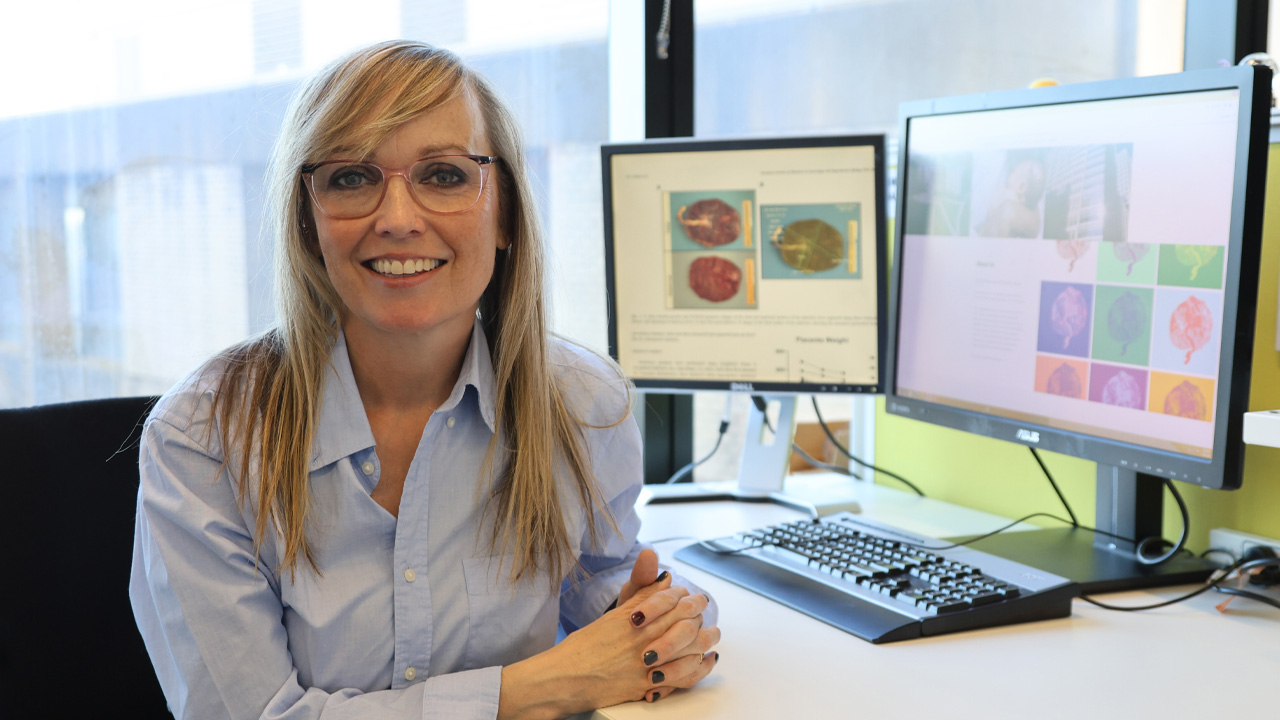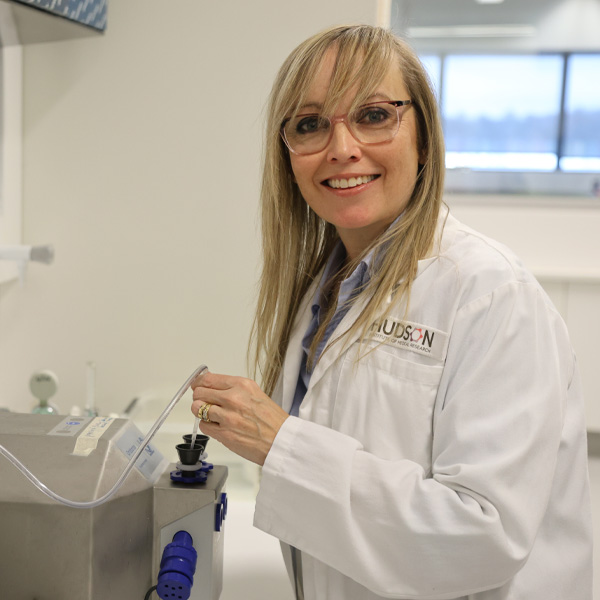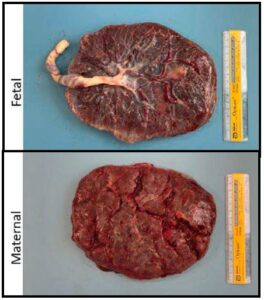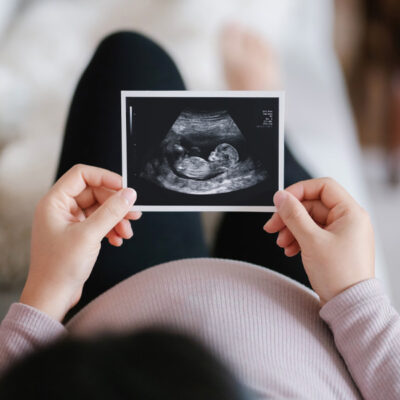What can placentas reveal about pregnancy and beyond?
By Rob Clancy, staff writer. Reviewed by Dr Emily Camm

In many traditional communities, the placenta is regarded with significant spiritual and symbolic importance.
Key points: placenta analysis
- Various visual features of the placenta (size, shape, position of the cord) are known to be linked to an individual’s risk of a range of conditions in later life.
- Dr Emily Camm is combining traditional clinical examination of the placenta with newly-developed AI-based analysis to better identify these risk factors.
- The aim is to discover what each placenta can reveal about the pregnancy, and the clues it might also provide to the baby’s longer-term developmental outcomes.
Dr Emily Camm is taking a 21st century approach to the placenta’s significance by incorporating Artificial Intelligence (AI)-based analysis to identify the risk of child developmental issues, even before they appear.
Dr Camm’s work at Hudson Institute of Medical Research centres on discovering what each placenta can reveal about the pregnancy and the clues it might also provide to the baby’s longer-term developmental outcomes.
Placenta analysis: future health
Her research looks for clinically relevant features of placentas, especially in pregnancies that have been compromised by placental insufficiency, which can impair fetal growth.
“We look at things like the size, cord placement, colour and shape of the placenta,” Dr Camm said, “…as well as evidence of any abruption or haemorrhaging.”
“There is significant evidence linking placental dimensions and features to an individual’s risk of stroke, hypertension, metabolic and heart disease in adult life. There is also emerging evidence that links placental morphometry to fetal brain development and likely childhood behaviour and cognition.”
Thanks to funding from the Norman Beischer Foundation, Dr Camm has been conducting detailed analysis of placentas from a range of pregnancy complications, and now she is looking to combine that with the latest, cutting-edge artificial intelligence (AI) technology.
Using AI to analyse the placenta
“Collaborators at Penn State University in the USA have developed a technique that uses AI to automatically analyse the placenta and identify the presence of particular placental features which could lead to serious developmental issues down the track,” Dr Camm said.
Working with colleagues from the Mercy Hospital for Women, the Murdoch Children’s Research Institute and The University of Western Australia, Dr Camm and the team undertook a pilot study using this system to establish the feasibility of using images captured of the placenta to derive a range of placental measures.
“Using this technology, we have an opportunity to photograph the placenta as soon as possible after birth and have it analysed in a matter of minutes, meaning we can get a head start on identifying possible issues of concern.”
“Integrating information obtained from digital images with clinical data could aid in providing a detailed fingerprint of an individual’s risk profile, and thus, inform specific care pathways for women and their babies to lessen the lifelong health burden of complicated pregnancies.”
Ancient Egyptians, as well as some other cultures, believed that the placenta is the child’s secret helper or guardian angel[i]. Using the latest diagnostic technology, Dr Camm and her colleagues are striving to make that more true than ever.
Placenta 101
The placenta, often overlooked but crucial, plays a pivotal role in a baby’s health. Formed by about 12 weeks into pregnancy, this awe-inspiring organ nurtures the growing fetus.
Here’s what it does
- Nutrient and oxygen delivery: The placenta acts as a lifeline, delivering essential nutrients (like vitamins, glucose, and water) and oxygen from the parent’s body to the baby[ii]. A healthy placenta ensures optimal growth and development.
- Waste removal: It also transports waste products, such as carbon dioxide, from the baby back to the parent’s body[iii]. Efficient waste removal is vital for the baby’s well-being.
- Antibodies and immunity: The placental cells create a deep connection between parent and baby, providing antibodies that bolster the baby’s immune system[iv]. This early bond sets the stage for lifelong health.
- Blood flow and health: Interestingly, blood flow through the umbilical cord and placenta can predict the baby’s health. More forward blood flow (from baby to placenta) indicates better health, while reduced flow is associated with low birthweight babies[v].
During pregnancy, health care providers closely analyse the placenta as part of routine prenatal care. Certain conditions, like high blood pressure, diabetes, and anaemia, can affect placental health. Additionally, pregnancies complicated by severe hyperemesis gravidarum (HG) are at higher risk of associated placental dysfunction disorders4. So, placenta research provides valuable insights into both parent and baby health.
Sources
i https://www.ncbi.nlm.nih.gov/pmc/articles/PMC1779650/
ii https://www.babycentre.co.uk/a25036426/the-placenta-what-it-is-and-how-it-works
iii https://www.sciencenews.org/blog/growth-curve/placenta-baby-embryo-health
iv https://therygroup.com/en-gb/blogs/pregnancy-advise-tips/the-role-of-the-placenta
v https://www.parents.com/news/placenta-analysis-during-pregnancy-after-birth/
Collaborators | Penn State University USA, Mercy Hospital for Women, Murdoch Children’s Research Institute, University of Western Australia
This research was supported by | Norman Beischer Foundation
Journal | European Journal of Obstetrics & Gynecology and Reproductive Biology
Title | Assessment of an AI-based tool for population-wide collection of placental morphological data
View publication | https://www.sciencedirect.com/science/article/abs/pii/S0301211524002732
In this article
About Hudson Institute
Hudson Institute’ s research programs deliver in three areas of medical need – inflammation, cancer, women’s and newborn health. More
Hudson News
Get the inside view on discoveries and patient stories
“Thank you Hudson Institute researchers. Your work brings such hope to all women with ovarian cancer knowing that potentially women in the future won't have to go through what we have!”







